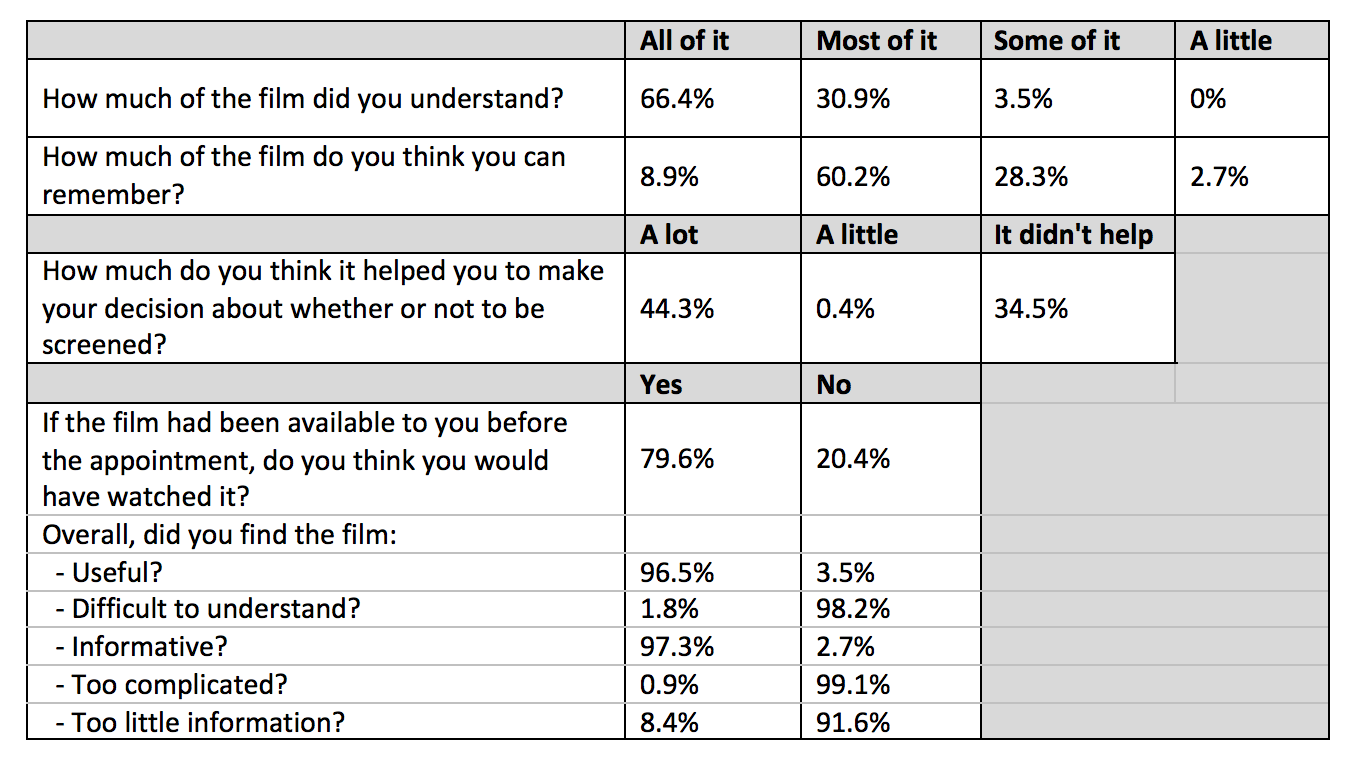Virtual Library
Start Your Search
Josephine Waller
Author of
-
+
P2.11 - Screening and Early Detection (Not CME Accredited Session) (ID 960)
- Event: WCLC 2018
- Type: Poster Viewing in the Exhibit Hall
- Track:
- Presentations: 2
- Moderators:
- Coordinates: 9/25/2018, 16:45 - 18:00, Exhibit Hall
-
+
P2.11-28 - A Focus Group and Interview Study to Explore the Information-Needs of Lung Cancer Screening Participants (ID 12753)
16:45 - 18:00 | Author(s): Josephine Waller
- Abstract
Background
Lung cancer screening (LCS) by low-dose CT has been shown to improve mortality, but individuals must consider the potential benefits and harms before making an informed decision about taking part. In the US a shared decision-making process is mandated to qualify for LCS reimbursement. However, screening eligible individuals’ (SEI) specific views of these harms, and their preferences for accessing this information, are not well described.
a9ded1e5ce5d75814730bb4caaf49419 Method
16 semi-structured interviews were carried out with general practitioners, public health consultants, respiratory physicians and lung cancer nurse specialists. 35 SEI participated in seven focus groups, which were divided into current vs. former smokers and lower vs. higher educational backgrounds. Interviews and focus groups were audio-recorded and transcribed. Data were coded inductively and analysed using the framework method.
4c3880bb027f159e801041b1021e88e8 Result
Lung cancer was generally perceived as an incurable condition, and smokers appeared to be particularly fatalistic. Despite this, a ‘belief in screening’ emerged from the interviews and focus groups. Participants’ appetite for information varied; with many expressing a ‘right’ to be given all the information, while others cautioned against too much information, and HCPs also acknowledged this dichotomy. Of the harms of screening, false positives and false negatives generated the most concern, though for most participants, even these were unlikely to deter them from screening. Participants were aware of the harms of smoking though many current smokers perceived other factors as more detrimental to their health than smoking. Regarding smoking cessation advice at screening, most focus group and interview participants preferred an emphasis on the benefits of quitting, and for advice to be delivered in a positive and empowering manner.
8eea62084ca7e541d918e823422bd82e Conclusion
These findings can be used to directly inform the way in which information is presented to SEI in order to aid the shared decision-making process, motivate smoking cessation and minimise barriers to uptake of LCS.
6f8b794f3246b0c1e1780bb4d4d5dc53 -
+
P2.11-29 - Impact of an Information-Film to Promote Informed Decision-Making in Individuals Taking Part in a Lung Cancer Screening Demonstration Pilot (ID 12757)
16:45 - 18:00 | Author(s): Josephine Waller
- Abstract
Background
Lung cancer screening by Low Dose CT (LDCT) is underway in the United States, where a shared decision-making process is mandated for insurer funding. The potential harms of screening are complex and difficult to communicate. Participants do not always read written materials and audio-visual aids have been shown to improve informed decision-making in other areas of medicine. There are limited studies on the use of decision aids in lung cancer screening.
a9ded1e5ce5d75814730bb4caaf49419 Method
A five-minute information-film was made to explain the benefits and risks of lung cancer screening. Qualitative research informed the content and format to make it accessible for individuals of varying demographic and educational backgrounds. A sub-sample of participants (n=229) from a lung cancer screening pilot were randomised to watch the film and read a written information booklet (Group A) or read the booklet alone (Group B). Objective and subjective knowledge of the risks and benefits of screening were assessed before and after the intervention, and again after discussion with a heath care professional, when decisional conflict and satisfaction were also assessed.
4c3880bb027f159e801041b1021e88e8 Result
120 and 109 participants were randomised to groups A and B respectively. There was a statistically significant improvement in subjective and objective knowledge scores post-administration of the intervention in both groups (p<0.001). In a multivariate analysis adjusted for educational level and baseline knowledge score, post interventional scores were independently associated with film group (p=0.036). There were no group differences in decisional conflict or satisfaction, or in subsequent attendance for LDCT. Participants’ views on the acceptability of the film are presented in table 1.
Table 1: Feedback and acceptability of information film
8eea62084ca7e541d918e823422bd82e Conclusion
The information-film was well-accepted and increased knowledge scores more than a written booklet alone, without raising decisional conflict or reducing attendance for LDCT.
6f8b794f3246b0c1e1780bb4d4d5dc53


